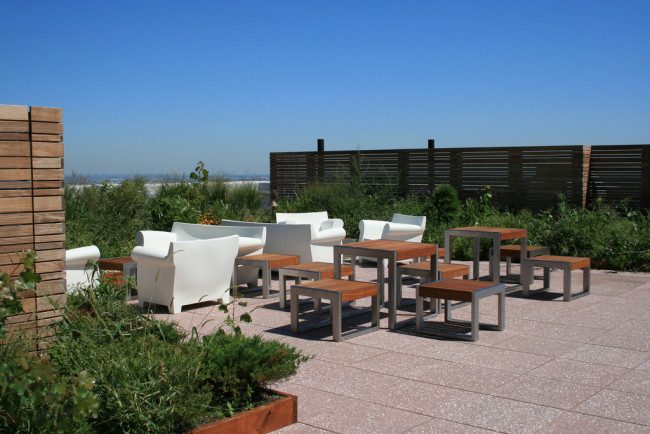How to keep the peace in a shared outdoor space (or any shared space for that matter)

Don't they all look happy?
Yes, we're reaching the end of the summer (sorry guys, it's true!), but New Yorkers are known to squeeze as much enjoyment out of their outdoor spaces for as long as is humanly possible. And even as the weather cools, many end up taking the socializing indoors, sharing common spaces that have long become the staple of new developments and co-ops looking to up their amenity quotient. To keep matters civil, we checked in with some experts to learn the etiquette rules for sharing space worth following and implementing:
Research and follow the rules.
"Before having a rooftop gathering, be sure to contact the building manager to stay in-the-know on rules and regulations," says Instrata Lifestyle Residences concierge Caitlin Porpora. And even if you're not hosting a party, per se, you should follow any and all rules set forth by the co-op board or building manager.
In fact, many property managers will clearly post the rules in shared spaces to clear up any questions from the get-go. The most common rules, says Todd Stevens, a broker with Douglas Elliman who also owns a small building with common outdoor space, have to do with scheduling. "Usually the rule is that you can be out there until 11 pm on weeknights and midnight on the weekends," he says. Some (usually larger) buildings will have explicit rules about reserving the space if you have more than a certain number of guests.
Oftentimes, no animals, no alcohol (it can be dangerous, especially on a roof), no smoking, and sometimes even no food.
Paul Gottsegen, president of Halstead Management Company, says property managers are starting to prohibit barbecuing in common spaces, because insurance companies are cracking down on that. Also quickly becoming no-nos: "No radios without headphones and no glass." "Cleaning up broken glass is bound to put the brakes on your bash," says Porpora, and may even get you banned from the space. "Unbreakable cups and plates are your best friend."
Leave no trace.
"You're fined $100 by the city if you leave trash outside your building, but if you leave it in a common space, there are no rules, and I think that's the biggest problem," says Elliman's Stevens. "It's about cleaning up after yourself."
Adds Daniel Post Senning of the Emily Post Institute: "Use the campsite rule: Leave it a little better than you found it. Don’t hesitate to take a piece of trash that you didn’t bring."
Be reasonable about noise.
The amount of noise you can make depends on the space itself. "You need to think about how it relates to the building. If it’s a rooftop that doesn’t connect to any units, there's more freedom, but if it's connected to three apartments, you need to be aware of that," says Jeffrey Erb, a NYC-based designer who specializes in outdoor spaces.
Take responsibility.
"If you’ve got pets or kids, make sure you take particular care and make sure that you’re reponsible for them," says Senning. "Shared playspaces, in particular, aren’t daycares, and don’t lean on other people to supervise and take care of your kids."
And if you're designing outdoor space for a building...
3. A note about signage: While rules used to say things like "no children playing," that's now seen as discriminatory toward families and is a big legal no-no "Children are a protected class," says Halstead's Gottsegen. You can, instead, write things like "this area is for quiet reading," says Gottsegen, but just make sure that your wording can't be seen as discriminatory.




























